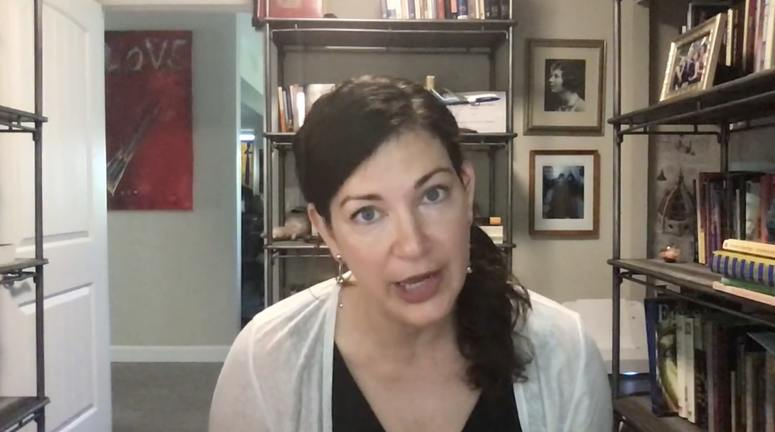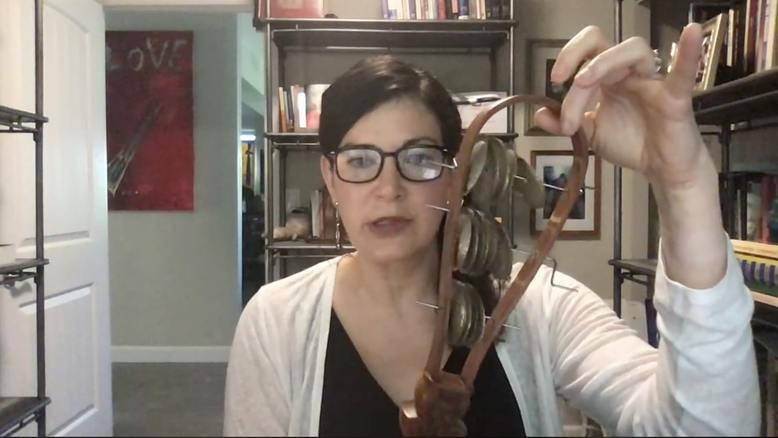Nat Geo Live’s latest virtual event was a Q&A with Egyptologist Kara Cooney, who answered questions from viewers about her work and what ancient Egypt can teach us about how we’re responding to current events. The author of The Woman who Would Be King and When Women Ruled the World is also a professor and chair of the Department of Middle Eastern Studies at UCLA. She’s currently working on projects related to the crisis during the bronze age collapse and coffin reuse in ancient Egypt.
Studying Egypt gives Kara a better understanding of the future because they had 3,000 years of growth using the same language and legal and economic systems. The United States is only 250 years old in comparison, so there’s not a lot of history to forecast from. Of particular note for modern times, Egyptians had periods going back and forth between authoritarian types of rulers and female powers, as well as health pandemics, which she talked about during the chat.
Kara brought out a visual aid to discuss how ancient Egyptians responded to plagues. It’s called a sistrum and it’s a musical instrument that makes a rattling noise that was used to calm evil goddesses who were believed to be responsible for the deaths of many Egyptians. It may sound a little silly, but you can find plenty of examples today of people interpreting the current pandemic through their religious beliefs and making claims based on faith rather than science. The principal was based on a story called “The Book of the Heavenly Cow.” In the story, the sun god sends down a lioness goddess to devour the Egyptians who have defied him. The sun god later regrets his decision and tries to call his daughter back, who has become so consumed with rage that she is irrational. The Egyptians are able to trick her by filling a pit in the desert with beer dyed with red okra to look like blood. The goddess drinks the beer disguised as blood, gets drunk, and calms down, sparing the rest of the Egyptians' lives.
The story of “The Book of the Heavenly Cow” is referred to by Egyptologists as “The Destruction of Mankind” and also reflects some gender stereotypes that are still alive today. Goddesses were usually represented by predatory animals and bugs like lions and scorpions and king’s would surround themselves with statues of them for protection, but they were also viewed as being hormonal and unpredictable, blamed for chaos in society. In the story, men had to trick the woman into getting drunk to calm her rage. At the same time, the most powerful women in the ancient world were Egyptian rulers, as she wrote about in a special issue of National Geographic titled Queens of Egypt.
Everyone knows the name Cleopatra, who was one of Egypt’s last rulers and became a cautionary tale of a feminine rule that ended badly, inspiring many works of fiction including William Shakespear. Cleopatra ruled Egypt at an interesting time, setting up alliances with Julius Caesar and Mark Anthony by having children with both and setting her kids up as future leaders, but an invasion of Iran crippled her forces and led to her downfall. Had she not gone that route, her story may be remembered differently. In a display of toxic masculinity for the times, another female Pharaoh named Hatshepsut was removed from historical records, her image chiseled off stone walls and her name masculinized in historical records of her reign.
Kara’s favorite queen of Egypt is Nefertiti, wife of Pharaoh Akhenaten. She was famously very beautiful, but new research is revealing that she co-ruled Egypt with her husband, who made a huge mess in Egypt by changing their religious system, defunding churches and funneling that money into a new capital city. Following his death, a shadow pharaoh named Smenkhkare cleaned up his mess, restoring Egypt to the way it was before his rule. Some scholars believe that Smenkhkare was really a fake name used by Nefertiti disguised as a male. Egyptologists are still studying documents and examining coffins for traces of being reused to unlock a secret identity story that seems plausible.
In terms of ancient Egypt’s biggest influence on modern civilization, Kara feels it’s their level of god kingship, something that people still crave today. There’s been a resurgence around the world of citizens electing politicians that seem larger than life, full of false claims and who brag about their achievements, very much in the same way the Pharaohs made up ancestry to gods and claimed to have superhuman powers. People feel a comfort and a safety in that, which is why these kinds of leaders have come in and out of power throughout time in many countries. Another project Kara is working on is a book called The Good Kings about authoritarianism in ancient Egypt for Nat Geo books. It explores how Pharaohs set themselves up using religion and ideology as good authoritarianism and why humans are returning to authoritarian personalities. It will also approach feminist questions through a patriarchal lens, examining why we’re attracted to strong masculine rule and why it makes us feel safer.
As for the biggest misconception about ancient Egypt, it’s a belief that the pyramids were built by aliens. By believing that, people are actually buying into the very propaganda the Pharaohs who built them wanted their kingdom to believe. They want you to believe that they were not of the human world and the mystery of building pyramids is part of that allure. The Great Pyramid is 50 stories tall and looks impossible to have been built by hand without modern tools. It’s true that Egyptologists still don’t know how they were built, but John Pierre Houdin’s theory is Kara’s favorite. He explored his hypothesis with National Geographic, which you can see in the video below.
In the same way that Lin-Manuel Miranda’s Hamilton reminds audiences that the founding fathers' lives weren’t that unlike ours today, Kara Cooney’s talk about ancient Egyptians reminds us that the human condition is still largely the same. It brings Kara comfort to know that the ancient Egyptians were just as freaked out about a virus as we are today. Egypt has survived centuries of human trials and serves as a source of inspiration for generations to come.
You can participate in future Nat Geo Live events by joining their Facebook page and following the schedule above. Our past coverage includes ocean explorer Brian Skerry and wildlife filmmaker Bertie Gregory. You can click here to watch Kara Cooney’s full presentation.
You can watch National Geographic’s Lost Treasures of Egypt on Disney+.



